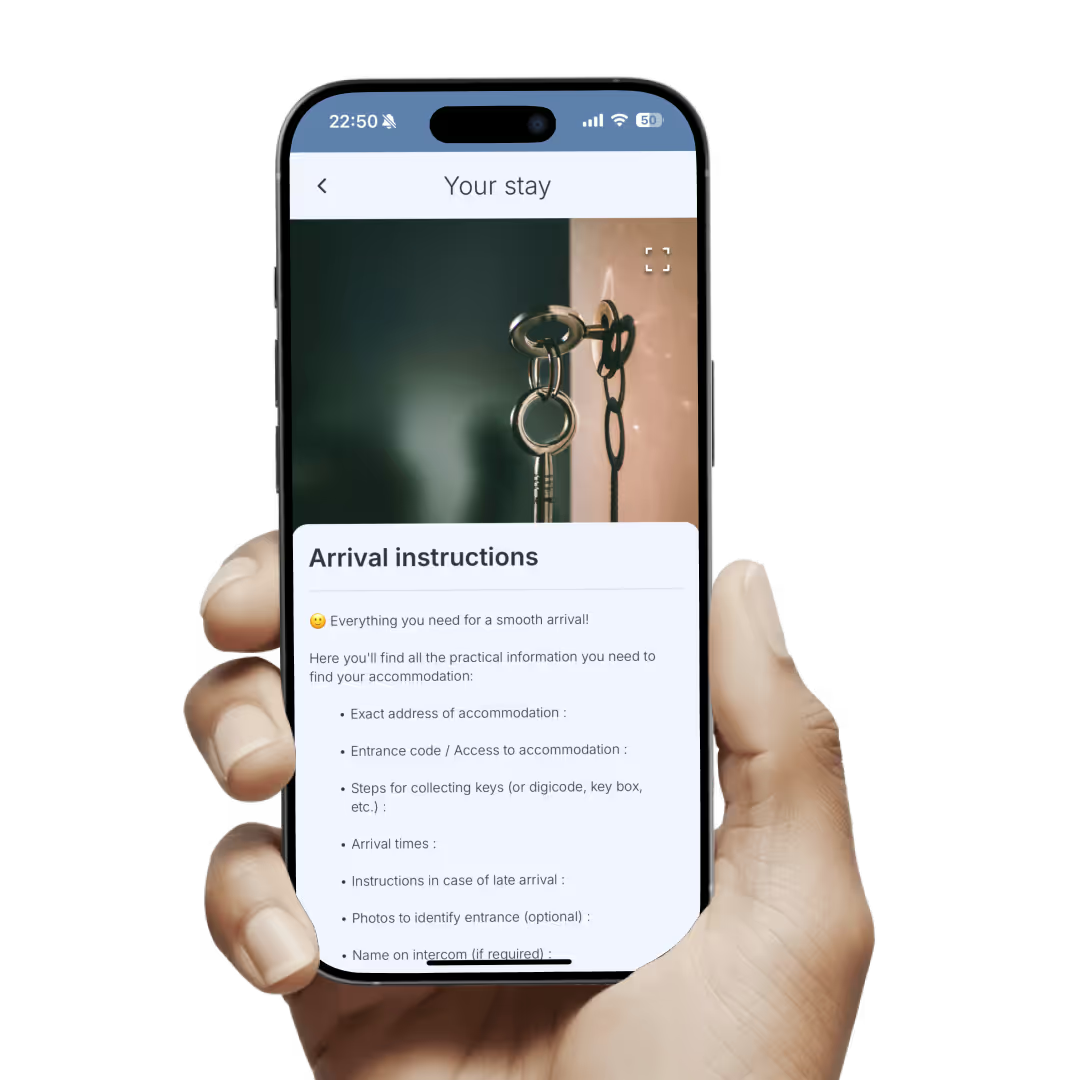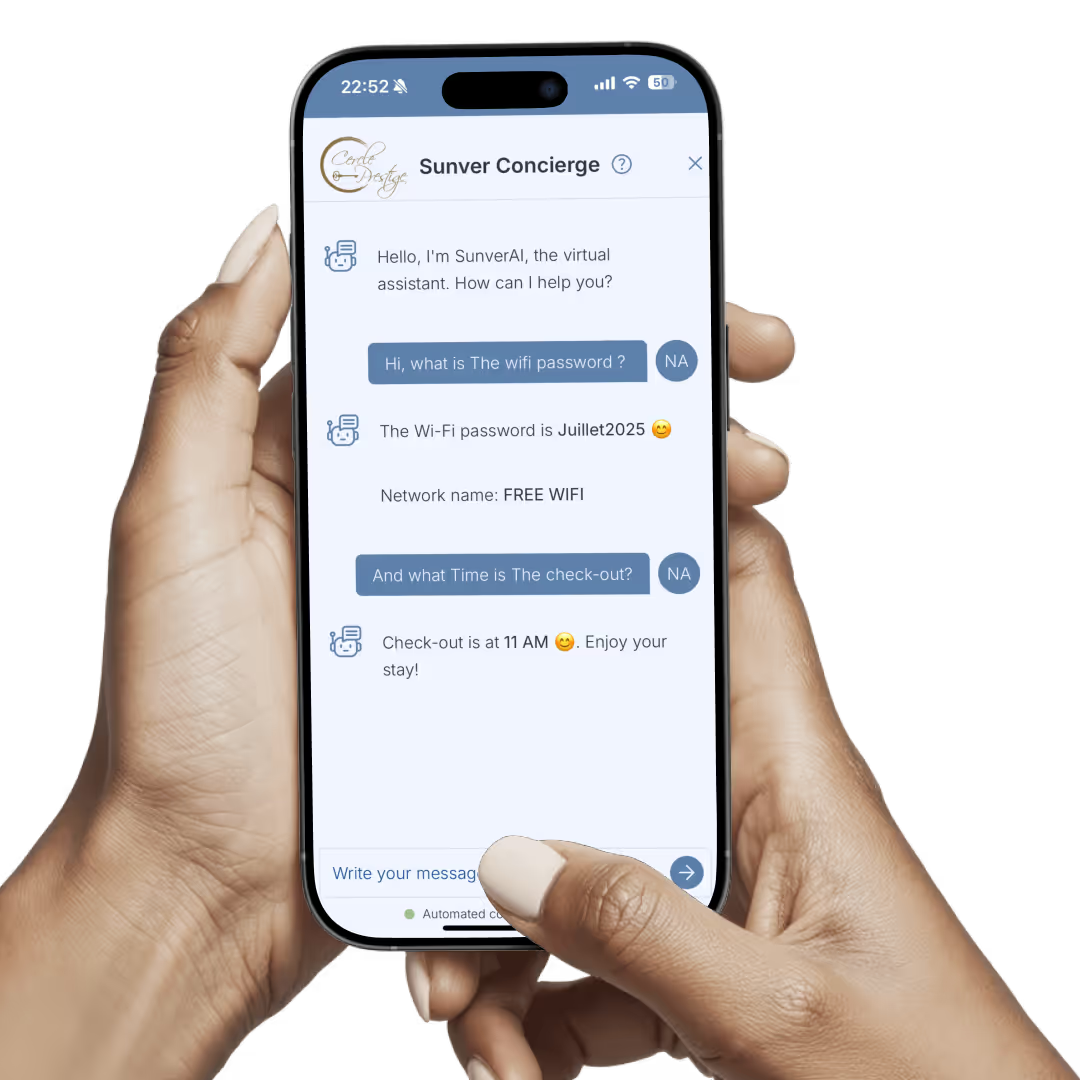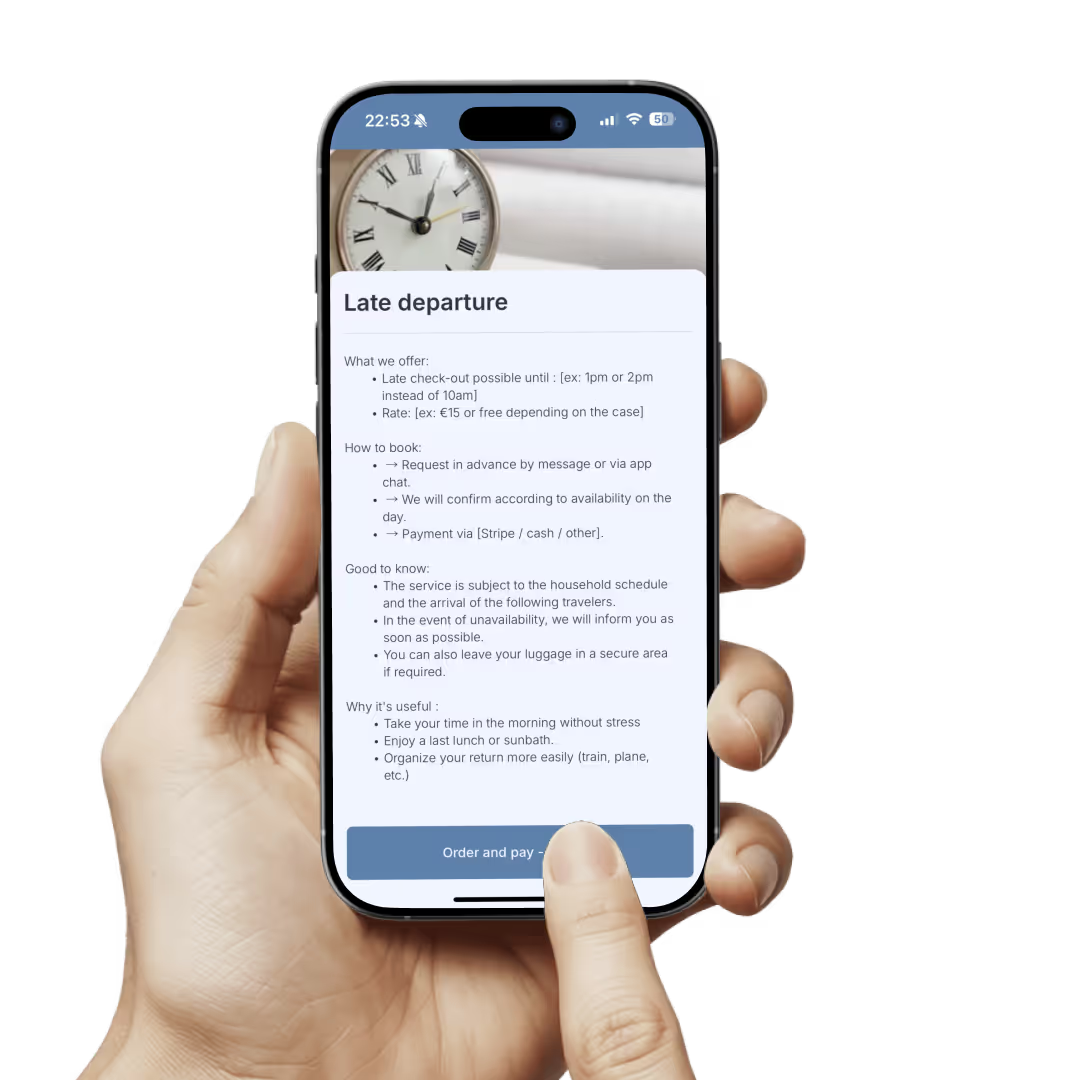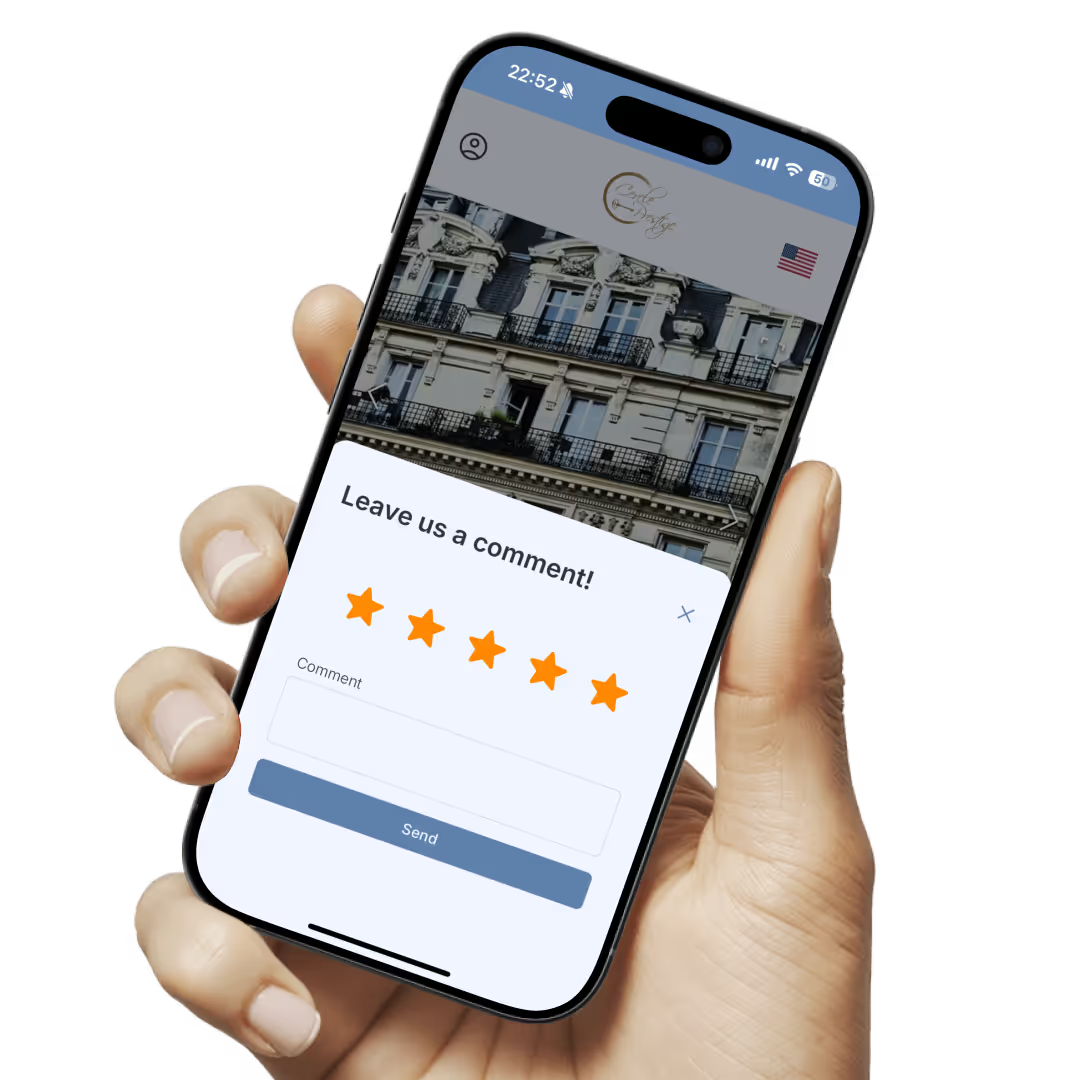How to Improve Guest Satisfaction in Hospitality
Discover the key factors that shape guest satisfaction and learn proven, actionable ways to elevate the guest experience across every touchpoint.

Why Guest Satisfaction Is the Heart of Hospitality
Guest satisfaction isn’t just about a smile at check-out — it’s the foundation of a successful hospitality business. Every review, every referral, and every repeat booking begins with how a guest feels during their stay.
In an age where travelers expect convenience, personalization, and authenticity, hotels and short-term rentals can no longer rely solely on good service — they need consistent, thoughtful experiences that anticipate needs before guests even express them.
The Real Cost of Unhappy Guests
A single disappointed guest doesn’t just leave a bad review; they influence dozens of potential customers. Studies show that travelers are far more likely to share negative experiences than positive ones, and online reputation directly impacts booking rates.
Beyond ratings, poor satisfaction leads to:
- Lost repeat customers
- Increased customer acquisition costs
- Demotivated staff dealing with complaints
- Reduced average spend per guest
Simply put: a guest who leaves unhappy costs far more than the effort required to delight them in the first place.
What Drives Guest Satisfaction Today
Guest satisfaction in 2025 goes far beyond clean rooms and polite staff. It’s shaped by a combination of emotional, operational, and digital factors that together create a seamless guest journey.
Key drivers include:
- Ease of communication: Guests want quick answers, ideally through their preferred channels — whether WhatsApp, email, or digital guidebooks.
- Cleanliness and comfort: Hygiene remains a top priority post-COVID, with visible cleaning protocols reassuring travelers.
- Personalization: Guests appreciate tailored experiences — a “welcome back” note or restaurant recommendation that matches their profile can make all the difference.
- Technology and autonomy: Contactless check-in, mobile apps, and digital concierge tools empower guests while freeing up staff time.
- Responsiveness: Fast, empathetic handling of issues transforms complaints into trust.
10 Proven Strategies to Boost Guest Satisfaction
1. Make a Memorable First Impression
Your guest experience begins the moment they receive their booking confirmation.
Send a warm, informative pre-arrival message with directions, check-in details, and local tips.
A smooth, welcoming arrival sets the tone for the entire stay.
2. Personalize Every Step
Use data wisely — not intrusively — to personalize communication.
If a guest often travels for business, highlight your workspace amenities.
If they’re on a family vacation, share family-friendly activities nearby.
Small gestures like remembering a repeat guest’s favorite room or coffee order show genuine care.
3. Empower Guests with Digital Tools
Today’s travelers value independence. Offer mobile check-in, digital keys, or a web-based guest app with all essential information — Wi-Fi, services, local guides, and support contacts.
This minimizes repetitive questions and reduces waiting time at reception, all while maintaining your brand image.
4. Keep Communication Open and Honest
Proactive communication prevents frustration.
If maintenance affects a facility or the restaurant is closed for renovation, inform guests in advance.
Transparency builds trust — surprises do not.
5. Handle Problems with Grace
Mistakes happen. What matters is how they’re handled.
Train staff to listen, apologize sincerely, and act quickly.
A complimentary upgrade or small gesture — a dessert, a late check-out — can turn a complaint into a five-star review.
6. Maintain Impeccable Cleanliness
Cleanliness is non-negotiable. From spotless lobbies to fresh linens, visible hygiene standards are essential.
A clean environment not only improves comfort but also communicates professionalism and safety.
7. Train and Empower Your Staff
Happy employees create happy guests.
Regular training, recognition, and clear communication foster confidence and empathy — two qualities that define great hospitality.
Encourage your team to think proactively and own the guest experience.
8. Use Guest Feedback to Improve
Don’t wait for online reviews to find out what guests think.
Gather feedback through short in-stay surveys or post-check-out messages.
Acting on insights shows guests that their opinions truly matter — and keeps issues from recurring.
9. Offer Value Through Extras and Upsells
Upselling isn’t about pushing — it’s about enhancing.
Offer relevant add-ons like early check-in, airport transfers, or local experiences.
When done transparently, upsells increase satisfaction and revenue.
10. Follow Up After Departure
Stay connected once guests leave.
A personalized thank-you email or loyalty offer can turn one-time visitors into brand advocates.
Encourage them to share reviews and photos, reinforcing your hotel’s online reputation.
The Role of Technology in Modern Guest Satisfaction
The hospitality industry has entered the era of smart automation. Technology no longer replaces human service — it amplifies it.
Examples of impactful hotel tech:
- AI-powered chat assistants: Provide instant answers to guest questions 24/7.
- Integrated communication hubs: Centralize WhatsApp, email, and SMS in one platform.
- Dynamic digital guidebooks: Share property details, services, and recommendations in multiple languages.
- Contactless payments and upsells: Allow guests to book and pay seamlessly, increasing convenience and revenue.
Technology should simplify operations, not complicate them — freeing teams to focus on what really matters: human connection.
Cleanliness, Consistency, and Care: The New Luxury
Luxury today isn’t about marble lobbies — it’s about effortlessness. Guests want to feel considered, informed, and respected.
Consistency across touchpoints — from pre-arrival messages to check-out — creates a sense of reliability that guests remember and reward with loyalty.
Frequently Asked Questions
What is guest satisfaction in hospitality?
It’s the measure of how well a property meets or exceeds guest expectations across service, comfort, and communication.
How can hotels improve satisfaction quickly?
Start by improving communication, ensuring spotless cleanliness, and responding promptly to issues. Even small changes — like digitalizing guest information — can yield big results.
Why does technology matter for guest satisfaction?
Tech automates repetitive tasks, ensures consistent communication, and enables guests to manage their stay independently — all while enhancing personalization.
Final Thoughts: Excellence Is Built on Details
Improving guest satisfaction isn’t a one-time project — it’s an ongoing mindset.
From the way you greet guests to how you handle feedback, every interaction shapes perception.
In a market where experiences matter more than amenities, the best investment you can make is in understanding your guests — and continuously finding smarter, simpler ways to make them feel at home.
Much more than a welcome guidebook
A web application accessible without download, via QR code or link, automatically translated into your guest’s language.




Frequently asked questions
Everything you need to know about Sunver.
What is Sunver?
Sunver is a solution that allows you to easily create your own digital welcome guidebook to simplify communication with your guests. It enhances the guest experience, saves you time every day, and helps you generate additional revenue. Setting up a guidebook is intuitive—similar to creating a Facebook profile.
How do I set up Sunver?
You can create your first guidebook directly from our website in just a few minutes and experience the simplicity of the solution for yourself. If you are a hospitality professional, our team also offers a full demo via video call, helping you with setup and customization.
How can I share my guidebook with guests?
There are two main ways to share your guidebook:
1. Send the link directly after booking or during the stay through your automated messages.Provide
2. QR code displays inside your accommodation so guests can scan and access the guidebook instantly.
You can also print your display for free from your Sunver dashboard or order physical QR code supports directly from our website.
Do my guests need to download anything?
No, your guests don’t need to download anything. Sunver runs as a web app, meaning it’s hosted online, loads quickly, and is instantly accessible. Thanks to automatic translation, the guidebook will open directly in the guest’s phone language.
Can I promote my additional services with Sunver?
Yes, absolutely. With the guidebook modules, you can create a true digital shop and showcase your services, products, or exclusive offers. By connecting your Stripe account, you can accept payments directly without any commission taken by Sunver. Guests can pay in just one click from their smartphone.
The digital welcome guide your guests deserve
Give your guests a seamless experience — all your information, services, and recommendations, right at their fingertips.
